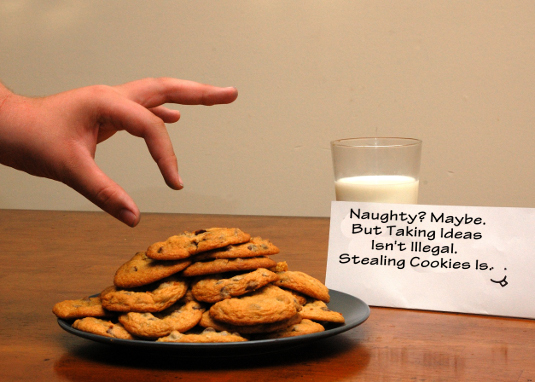When Is It Legal To Take Someone Else’s Ideas?

The title of this post is a little bit misleading. When I say take someone’s ideas, I don’t mean it in a very negative sense of the term, even though it may sound that way at first blush. Instead, what I mean is to grab an idea for a blog post or even for a product from someone else but to put your own spin on the concept. Here’s what you need to know:
Bad Information
Recently, I’ve seen a lot of bad information being promulgated regarding copyright law on a number of online forums and I wanted to set the record straight about what you can and cannot do with ideas you find online.
There are three kinds of protections in the United States (and the world at large) for intellectual property (i.e. things that are not physical, like an idea or a piece of writing or music).
Patents
A patent is the first kind of protection and the most restrictive. A patent is meant to protect an invention; however it’s often used to protect common knowledge ideas. For a while, lawsuits were flying left and right when people raced to the patent office to patent common ways of doing programming.
What is important for our purposes about patents though is not whether Apple had a right to make an iPod for example, but the fact that patents protect ideas for tangible inventions. They don’t protect ideas as a whole. That means for example, you can’t patent the idea of freedom of religion because it’s just an idea. You can patent the idea of an MP3 player because it’s an invention.
Trademark
A trademark gives a company specific rights to a particular word. So for example the word Coca Cola is a trademark and I’m not entitled to make my own cola flavored soft drink and call it Coca Cola. I am entitled however to mention the name here without asking for permission because I’m not in any way implying that I have a product owned by the Coca Cola Company.
Copyright
Finally, we get to the thing that is most relevant for people working online (the two concepts above are more important for those working in the offline world). I’ve seen an awful lot of stupid ideas being promulgated regarding copyrights and what you can and cannot do, which is why I wanted to write this blog post about it.
Here’s the most important thing to remember: IDEAS CANNOT BE COPYRIGHTED. This is extremely important to remember because too many people get the concept of a copyright confused. The only thing copyright protects is the expression of ideas.
That means that if you wanted to take this blog post and write your own blog post about what copyright does protect by using my ideas, I have absolutely no right to stop you from doing so. However, if you were to use my words or even just take this blog post and change a few words here and there to pass the Google duplicate content checker, then you would violate copyright.
What About Derivative Work?
Someone who is somewhat familiar with copyright laws may claim that taking someone’s ideas for your own product or blog post is illegal because you are violating the rules of derivative works. I just want to make clear what this is so there is no confusion:
The classic definition of a derivative work is the Mona Lisa with a moustache. This is clearly a different piece of work, however it is SUBSTANTIALLY based on a previous work. The artist simple took Da Vinci’s masterpiece and defaced it with a mustache. While one could argue matters of good taste, this is definitely a derivative work.
How Derivative Works Apply to Writing
Now, above I said that you can take my ideas and rewrite it in your own words. That’s true. If you don’t quote my words but completely re-write what I wrote in your own words for a blog post of your own, you are on 100% solid legal grounds.
However, if you were to take this blog post, change around one or two paragraphs, change a few words here or there but leave large chunks of my writing intact, that would be a copyright violation since you have created a derivative work. This is very important to understand when working online so you can understand what you can and cannot legally do.
Legal Disclaimer
Now for the thing the lawyers will insist on: this is not legal advice and should not be construed as legal advice. If you have any doubt as to whether or not you are violating copyright when you take an idea from someone else online, be sure to contact a qualified attorney for advice to ensure that you don’t run afoul of copyright laws in the United States or elsewhere.


Can you use things off the internet and put them in your website as long as you give them credit? Ex. (at the bottom of the page you put Source: yadayada.com
I was curious because almost everyone uses something someone else says. Is it legal then? Im dying to know, please please email me the answer. I cant seem to find it on the net. Thanks 🙂
Thanks. You just helped me a ton. So if something is copyrighted i can make something similar as long as i dont just steal their code and words right?
Is it okay to take someone’s work if they give it to you?
I’m not a lawyer so don’t take my advice as being legal advice but to the best of my knowledge, you would need to have written permission from them to do so.